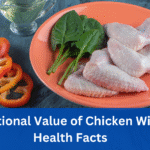When it comes to fast-food breakfasts, few menu items are as iconic as the McDonald’s Sausage Egg McMuffin. Since its introduction, the Sausage Egg McMuffin has been a go-to choice for busy mornings, road trips, and quick bites. But have you ever wondered what’s really inside this popular sandwich? What are the nutritional pros and cons? Whether you’re a fitness enthusiast, a health-conscious eater, or simply curious, understanding the nutritional profile of a Sausage Egg McMuffin can help you make more informed dietary decisions.
In this article, we’ll explore the ingredients, nutritional facts, health benefits, concerns, comparisons with similar products, and tips for making it a healthier option — all while maintaining the deliciousness that made it famous.
1. Overview: What is a Sausage Egg McMuffin?
At its core, the Sausage Egg McMuffin consists of a few key ingredients:
-
English muffin (toasted)
-
Sausage patty (seasoned pork)
-
Egg (freshly cracked)
Each element contributes distinct flavors and textures, combining to create a savory, satisfying breakfast sandwich that fits conveniently in one hand.
2. Nutritional Facts: Breaking Down the Numbers
Let’s look at the standard nutritional breakdown of one Sausage Egg McMuffin (values may vary slightly by location):
-
Calories: 480 kcal
-
Total Fat: 31 grams
-
Saturated Fat: 12 grams
-
Trans Fat: 0.5 grams
-
-
Cholesterol: 285 milligrams
-
Sodium: 830 milligrams
-
Total Carbohydrates: 30 grams
-
Dietary Fiber: 2 grams
-
Sugars: 2 grams
-
-
Protein: 21 grams
-
Calcium: 20% of the Daily Value (DV)
-
Iron: 15% of the DV
Key Observations:
-
High in calories: At 480 calories, it can make up a significant portion of a typical 2,000-calorie daily intake.
-
High in fat and sodium: High saturated fat and sodium levels can raise concerns if consumed frequently.
3. Ingredient-by-Ingredient Analysis
a. English Muffin
It offers a modest amount of carbohydrates and fiber but doesn’t contribute much fat or sugar.
b. Sausage Patty
Made primarily of ground pork, the sausage patty is seasoned with a blend of spices like sage, black pepper, and salt. It’s responsible for much of the sandwich’s fat, sodium, and protein.
c. Egg
McDonald’s uses a freshly cracked Grade A egg. Eggs are a rich source of high-quality protein, essential amino acids, and nutrients like vitamin D and choline.
d. American Cheese
The processed slice of American cheese adds creaminess, saltiness, and a bit of calcium but also brings saturated fats and preservatives.
4. Health Benefits: Is It All Bad?
Despite being a fast-food item, the Sausage Egg McMuffin does offer some nutritional upsides:
i. High-Quality Protein
The combination of egg, sausage, and cheese provides 21 grams of complete protein. Protein is crucial for muscle repair, enzyme production, and overall cellular function.
ii. Good Source of Micronutrients
It delivers calcium (important for bone health), iron (essential for oxygen transport), and vitamin D (key for immune function and bone strength).
iii. Satiety
Thanks to its fat and protein content, the sandwich is very filling, which may prevent overeating later in the day compared to carb-heavy breakfasts.
5. Health Concerns: Potential Downsides
However, there are important nutritional downsides to be aware of:
i. High in Saturated Fat
At 12 grams per serving, it accounts for over half of the American Heart Association’s recommended daily limit for saturated fat.
ii. Sodium Overload
With 830 mg of sodium, it supplies about 36% of the recommended daily intake (2,300 mg). High sodium consumption is linked to increased risk of hypertension and cardiovascular diseases.
iii. Cholesterol Content
285 mg of cholesterol can be concerning, especially for individuals with pre-existing heart conditions, although recent research suggests dietary cholesterol might not impact blood cholesterol as heavily as once thought.
iv. Low Fiber
With just 2 grams of dietary fiber, the sandwich does little to help meet daily fiber needs, which are critical for digestive health.
6. Comparisons: Sausage Egg McMuffin vs. Other Breakfast Items
Some important descriptions:
| Item | Calories | Protein | Total Fat | Sodium |
|---|---|---|---|---|
| Sausage Egg McMuffin | 480 | 21g | 31g | 830mg |
| Bacon, Egg & Cheese Biscuit | 450 | 19g | 26g | 1,250mg |
| Egg McMuffin (no sausage) | 310 | 17g | 13g | 770mg |
| Sausage Burrito | 310 | 13g | 17g | 800mg |
Takeaway:
-
The Bacon, Egg & Cheese Biscuit has similar calories but even higher sodium.
-
The Sausage Burrito has fewer calories but slightly less protein.
7. Is It Suitable for Different Diets?
a. Keto Diet
Thanks to its high fat and protein content, the Sausage Egg McMuffin can be adapted for a ketogenic diet — simply remove the muffin to reduce carbs.
b. Low-Sodium Diet
Not ideal due to its high sodium levels. People with hypertension or kidney disease should limit their intake.
c. Low-Fat Diet
Given its high fat content, it’s not suitable for those following low-fat regimens.
d. Gluten-Free Diet
The English muffin contains wheat, so it’s unsuitable for people with celiac disease or gluten sensitivity unless modified.
8. Tips to Make It Healthier
If you want to enjoy a Sausage Egg McMuffin while minimizing nutritional downsides, here are some strategies:
i. Customize Your Order
-
No Cheese: Removes around 50 calories and some saturated fat.
-
No Muffin: Makes it low-carb and keto-friendly.
-
Egg Whites Only: Ask for egg whites instead of a whole egg to reduce cholesterol and fat.
ii. Pair Smartly
Skip the hash browns or sugary drinks. Choose black coffee to maintain your overall meal more balanced.
iii. Portion Control
Important to stick to to portions.
iv. DIY Version
You can make a healthier version at home using leaner sausage, whole-grain English muffins, reduced-fat cheese, and adding vegetables like spinach or tomatoes.
9. The Bigger Picture: How Often Should You Eat It?
Occasional indulgence is unlikely to derail a balanced diet. However, regular consumption could contribute to an excess intake of saturated fat, sodium, and calories — raising long-term health risks like heart disease, obesity, and high blood pressure.
Nutrition experts often recommend following the 80/20 rule: eat nutritious, whole foods 80% of the time, leaving 20% for treats like the Sausage Egg McMuffin.
10. Conclusion: A Balanced Perspective
The Sausage Egg McMuffin is delicious, convenient, and satisfying — but it’s not without nutritional drawbacks. Rich in protein and essential vitamins, it also carries high levels of saturated fat, sodium, and cholesterol.
Ultimately, context is key. In moderation, and paired with an otherwise healthy lifestyle, enjoying a Sausage Egg McMuffin can fit into a balanced diet. If you’re mindful of your overall dietary patterns, make strategic modifications, and treat it as an occasional indulgence rather than a daily staple, you can savor its comforting taste without compromising your health goals.
Final Thought:
The Sausage Egg McMuffin holds a nostalgic place in the hearts of many. With a little mindfulness, you can enjoy it without guilt.
Q1: How many calories are in a Sausage Egg McMuffin?
A: One Sausage Egg McMuffin contains approximately 480 calories.
Q2: Is the Sausage Egg McMuffin a good source of protein?
A: Yes, it provides 21 grams of protein, making it quite filling and good for muscle maintenance.
Q3: Is the Sausage Egg McMuffin healthy?
A: It offers protein and essential nutrients but is high in saturated fat, sodium, and cholesterol. Moderation is key.
Q4: Can I eat a Sausage Egg McMuffin on a keto diet?
A: Yes, if you remove the muffin, it becomes more keto-friendly due to its high fat and protein content.
Q5: How often should I eat a Sausage Egg McMuffin?
A: It’s best to enjoy it occasionally as part of a balanced diet due to its high sodium and fat content.
Q6: Is there a healthier way to order it?
A: Yes, you can skip the cheese, choose egg whites, or remove the muffin to cut calories, fat, and carbs.
Q7: Is the Sausage Egg McMuffin gluten-free?
A: No, the English muffin contains wheat, so it’s not suitable for a gluten-free diet.
Q8: What are the main nutritional concerns with the Sausage Egg McMuffin?
A: The main concerns are high saturated fat, sodium, and cholesterol levels.





